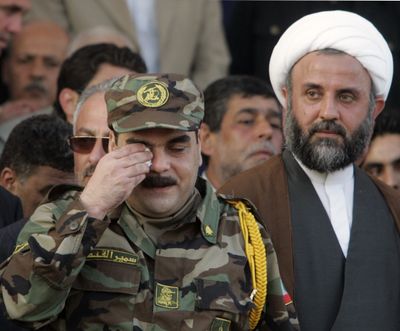Lebanon welcomes released militants
Israeli families prepare to bury fallen soldiers

ROSH HANIKRAH, Israel – As an Israeli military convoy carrying two flag-wrapped coffins wound slowly through Israel on Wednesday, convicted killer Samir Kuntar walked down a red carpet in a Lebanese village where he waved to throngs of jubilant supporters after spending nearly three decades in Israeli prison.
In a daylong drama, the final chapter in Israel’s costly 2006 war against Hezbollah came to a controversial close. Israel released Kuntar and four Hezbollah militants in return for two slain Israeli soldiers whose capture set off the 34-day conflict.
As Kuntar soaked up his first hours of freedom in Naqoura, he stood in the shadow of Hezbollah banners, printed in English to drive home to Western eyes the militant group’s public relations triumph: “Pain in Israel; Joy in Lebanon.”
The exchange sparked nationwide celebrations in Lebanon and mourning in Israel that reignited an unsettled debate over who won the 2006 war.
To Eli Ishmereni, a 50-year-old Israeli who stood in humid heat near the border crossing to await the return of the nation’s fallen soldiers, the answer is clear.
“It wasn’t worth it,” Ishmereni said of the war. “Today Hezbollah is even stronger, has more arms and more support.”
Lebanon’s fractious leadership, including Hezbollah’s bitter political rivals, joined together for a ceremony at Beirut’s international airport to hail Kuntar as a valiant warrior.
“Your return is a new victory,” Lebanese President Michel Suleiman told the returning prisoners. “And the future with you will only be a shining march.”
At a closed military base, Israel’s political leaders privately consoled the families of Ehud Goldwasser and Eldad Regev, the slain Israeli soldiers captured by Hezbollah in the July 12, 2006 cross-border raid.
Just what happened to Goldwasser and Regev wasn’t certain until a black SUV pulled up to the Lebanese border with Israel and Hezbollah pulled out two black coffins.
Within hours, medical tests confirmed that Goldwasser and Regev had died after the July 12 ambush.
In exchange for the two bodies, Israel agreed to release Kuntar, a notorious militant captured by Israel in 1979 after taking part in a brutal attack that ended with the deaths of four Israelis, including two young girls.
Along with Kuntar, Israel released four Hezbollah militants and the bodies of nearly 200 Palestinian and Lebanese fighters killed in battles over the decades.
While the families prepared to bury Regev and Goldwasser today, Hezbollah leader, Sheik Hassan Nasrallah, staged a massive welcome home celebration for Kuntar imprisoned before Hezbollah was established – and the four other prisoners.
“The era of defeats is over and a new era of victories has begun,” Nasrallah told tens of thousands of supporters waving Hezbollah flags.
In his first public statement after nearly 30 years in Israeli prison, Kuntar delivered a defiant speech in which he thanked Nasrallah and made a vow to stage more attacks on Israel.
Dressed in military fatigues with a yellow Hezbollah banner around his neck, Kuntar made a promise: “We are returning to Palestine with my brothers the mujahadeen and the Islamic resistance.”